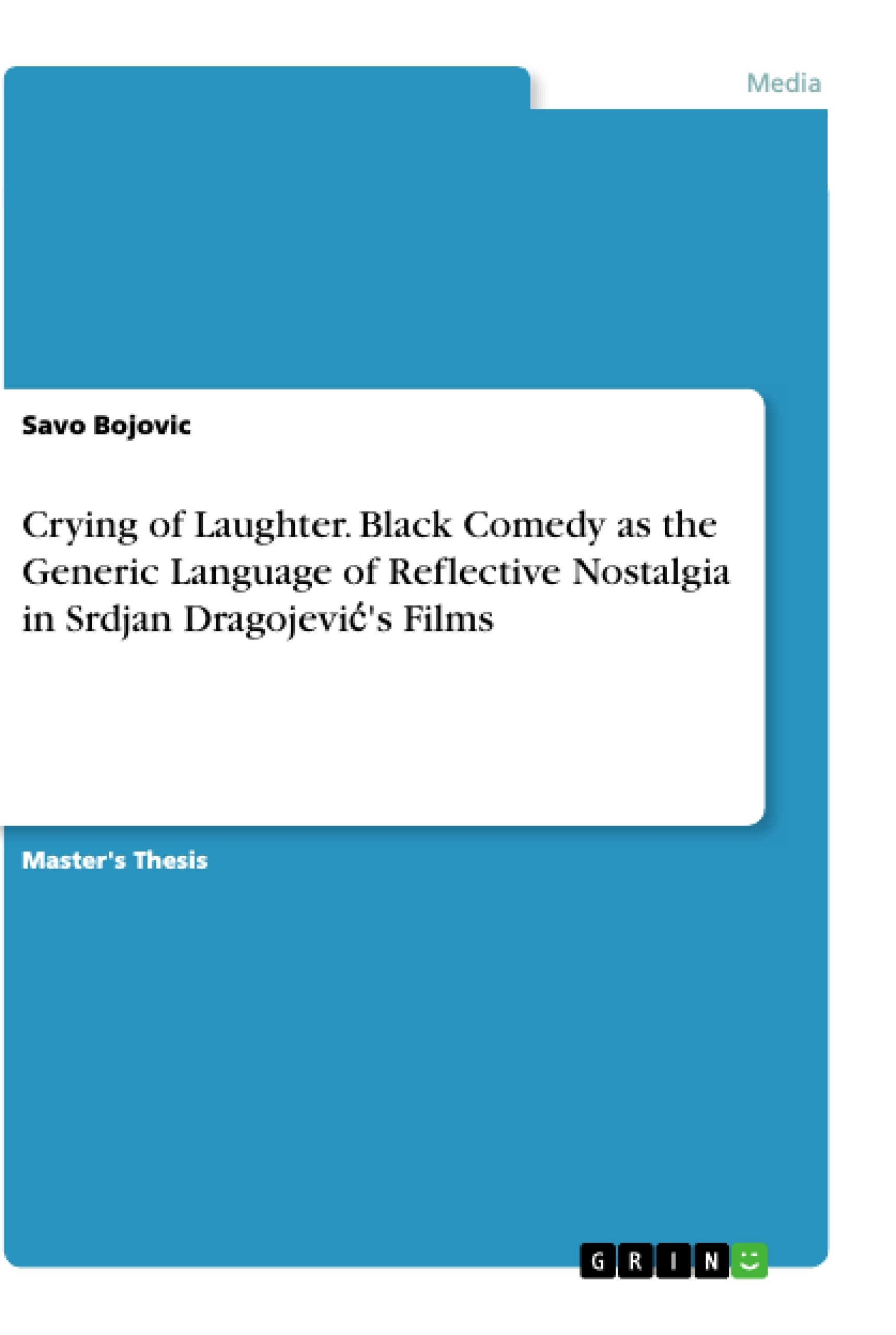The purpose of this study was to look at black comedy as the generic language of choice in depicting qualities of reflective nostalgia, in the context of Yugoslavia's break-up and as present in the films of Srdjan Dragojevic.
The key theoretical foundations of this study were found in Svetlana Boym's (2001) distinction of nostalgia-building efforts and sentiments, as well as in Juan F. Egea's (2013) research on the presence of dark humor in the Spanish comedies of the post- Franco era. Based on insights gained, a textual analysis of four of Dragojevic's films (Pretty Village Pretty Flame (1996); The Wounds (1998); The Parade (2011); and Holidays in the Sun (2014)) was conducted, as means of identifying and investigating the main filmic devices that Dragojevic employed in expressing one (nostalgia) through the other (black comedy).
Tools such as character caricaturizations, shot-framing, presence of mockumentarized content, and the selection and use of musical choices were employed as factors of analysis. Although thematically and chronologically (i.e. the time of production) different, the films were all found to represent such common features, further enhancing the idea that black comedy's potentialities for expressing nostalgic feeling are broad in nature and form of expression – as well as valid in inspiring future research on the topic.
Inhaltsverzeichnis (Table of Contents)
- Introduction
- Problem Statement
- The Films
- Relevance of the Study
- Theoretical Framework
- Nostalgia for What?
- The Two Nostalgias
- Restorative Nostalgia
- Reflective Nostalgia
- Black Comedy - the Genre of Imagined Communities
- Methodology
- Structure of Analysis
- Caricaturized Characters - Born of War
- The Camera Speaks - Framing the Context
- Mockumentary Miniatures – Spoofing News Broadcasts
- The Songs Speak - Mirroring with the Music
- Discussion
- Final Remarks
- Potential for Future Research
- Reference list
- Filmography
Zielsetzung und Themenschwerpunkte (Objectives and Key Themes)
This study explores black comedy as a prevalent genre for depicting reflective nostalgia in the context of Yugoslavia's dissolution, focusing on the films of Srdjan Dragojevic. Drawing upon Svetlana Boym's distinction of nostalgic sentiments and Juan F. Egea's research on dark humor in Spanish comedies, the study analyzes four of Dragojevic's films, investigating how black comedy is employed to express nostalgia. The analysis examines filmic devices such as character caricatures, framing, mockumentary elements, and musical choices.
- Black comedy as a generic language for expressing reflective nostalgia in post-Yugoslavian Serbian cinema.
- The thematic focus on Yugoslavia's break-up and its aftermath in Srdjan Dragojevic's filmography.
- The evolution of restorative nostalgic elements in Dragojevic's films over time.
- The interplay between black comedy and nostalgia in creating a sense of imagined communities.
- The filmic devices employed by Dragojevic to depict nostalgia through black comedy.
Zusammenfassung der Kapitel (Chapter Summaries)
The introduction sets the stage for the research by introducing the study's focus on black comedy as a reflection of nostalgia in post-Yugoslavian Serbian cinema, specifically within the works of Srdjan Dragojevic. It highlights the significance of Dragojevic's films in addressing the themes of Yugoslavia's breakup and its aftermath. The "Problem Statement" delves deeper into the thesis's central argument, stating its aim to explore how black comedy serves as a vehicle for expressing reflective nostalgia. The section on "The Films" provides concise synopses of the four films under analysis: "Pretty Village Pretty Flame," "The Wounds," "The Parade," and "Holidays in the Sun." Each synopsis outlines the films' key narratives, thematic concerns, and temporal settings in relation to the breakup of Yugoslavia. The "Relevance of the Study" emphasizes the research's contribution to understanding the unique use of black comedy in reflecting upon the historical and social context of the post-Yugoslavian era. It highlights the study's significance for both film studies and cultural studies, as it sheds light on the intersection of genre, national identity, and historical trauma.
Schlüsselwörter (Keywords)
The study's focus revolves around the intersection of black comedy, reflective nostalgia, post-Yugoslavian cinema, and the works of Srdjan Dragojevic. Key terms include: black comedy, reflective nostalgia, restorative nostalgia, imagined communities, filmic devices, character caricatures, framing, mockumentary, musical choices, post-Yugoslavian cinema, and Serbian film. The study examines the ways in which these elements converge to create a unique cinematic expression of historical and social upheaval. It explores how black comedy functions as a genre that simultaneously reflects upon the past, engages with the present, and constructs a sense of shared identity in a fragmented post-war context.
- Quote paper
- Savo Bojovic (Author), 2019, Crying of Laughter. Black Comedy as the Generic Language of Reflective Nostalgia in Srdjan Dragojević's Films, Munich, GRIN Verlag, https://www.grin.com/document/535759




